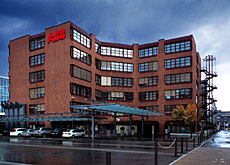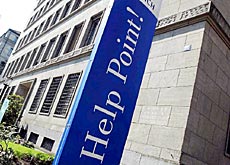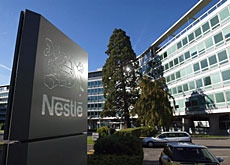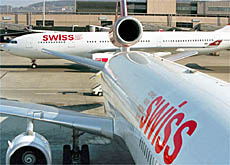“Black week” ends with growth warning

After one of the most dismal weeks in Swiss corporate history, new economic data shows the economy is unlikely to pick up before mid-2003.
On Friday, the Swiss Institute for Business Cycle Research’s quarterly barometer showed that growth would remain flat.
The grim prognosis follows days of negative financial headlines, dominated by record losses and thousands of job cuts.
Many of Switzerland’s top firms, including financial giants Credit Suisse and Zurich Financial Services, alongside the engineering group ABB and the pharmaceuticals firm Roche, all announced billion franc losses.
On Tuesday came news that the national airline Swiss – a company that carries the burden of Swiss national pride alongside a dwindling number of passengers – would drastically reduce its fleet and shed hundreds of jobs.
Worst year in a decade
New government economic figures, released on Thursday, underlined the negative picture.
According to the State Secretariat for Economic Affairs, 2002 was the worst year for business since 1993. Last year, GDP growth was just 0.1 per cent.
Economists have warned that Switzerland’s economic and corporate woes could deteriorate further if the government fails to trigger new growth by liberalising the economy.
“If you look at the past ten years, Swiss growth has been far below countries like Holland, Sweden and Denmark,” says Stéphane Garelli, an economist at Lausanne’s IMD business school.
“The Swiss – with their fence-sitting and [dithering] – have missed the train,” Garelli told swissinfo.
“The delay has cost the country years of missed growth.”
Joseph Deiss, the Swiss economics minister, expressed anger and frustration on Thursday at the seemingly endless flow of poor corporate results.
He vowed to end what he called Switzerland’s decade-long “moratorium on growth”, promising to liberalise Swiss markets, break-up import cartels and build more flexibility into the economy.
Troubles everywhere
However, many analysts worry that this week’s tranche of bad news suggests the global economic slowdown is hurting more than just the Swiss building industry – until recently the only sector visibly suffering.
The past few days have confirmed that few sectors of the Swiss economy are immune from the effects of the weak global economy.
The financial services industry has shown itself particularly vulnerable.
On Tuesday, Credit Suisse announced its worst result ever – a SFr3.3 billion loss.
Two days later, Zurich Financial Services broke records with its SFr4.6 billion net loss – the biggest in Swiss corporate history.
In the engineering sector – a long-standing source of growth for the Swiss – the embattled ABB group said it would rely on thousands of job cuts and asset sales to recover from a billion franc loss in 2002.
In the pharmaceuticals sector, Roche helped darken Switzerland’s “black week” by announcing it had more than obliterated its 2001 profit (of SFr3.7 billion) with a SFr4.03 billion wipeout in 2002.
The Clariant group, with a SFr648 million loss in 2002, showed the Swiss chemicals industry has not escaped the pain.
And although though there was some positive news – notably Nestlé’s SFr7.6 billion profit in 2002 – markets were in no mood to celebrate.
Nestlé stocks were pushed down slightly after the food group failed to meet its own growth target of four per cent.
On Saturday, the Bon Appétit group, which owns Usego, Pick Pay/Vis à Vis, announced that it would be shedding 300 jobs over the next three years. 150 from the group’s 5,000 employees are expected to be made redundant.
The group also annouced a loss of SFr 65 million for 2002.
Call for political action
Garelli blamed the low growth and high prices on Switzerland’s failure reform its economy, and called for the creation of a new federal ministry charged with fuelling wealth.
Garelli said a specialised economics ministry – charged with evaluating and directing decisions by the Swiss finance ministry – would boost Switzerland’s small and medium-sized businesses (SMEs).
“While multinationals can adapt to remain competitive without the intervention of political authorities, SMEs depend on the role played by politicians to boost the domestic economy,” said Garelli.
swissinfo, Jacob Greber
This week, many of Switzerland’s top firms announced billion franc losses and thousands of job cuts.
Hard hit were financial giants Credit Suisse and Zurich Financial Services, electrical engineering group ABB and the pharmaceuticals firm Roche.
The national airline Swiss also took a knock, saying it would lay off 700 workers and cut its fleet by 20 planes.
Finance officials said 2002 was the worst year for business since 1993, with GDP growth of just 0.1 per cent.
Experts blamed the low growth on Switzerland’s failure reform its economy.

In compliance with the JTI standards
More: SWI swissinfo.ch certified by the Journalism Trust Initiative







You can find an overview of ongoing debates with our journalists here. Please join us!
If you want to start a conversation about a topic raised in this article or want to report factual errors, email us at english@swissinfo.ch.